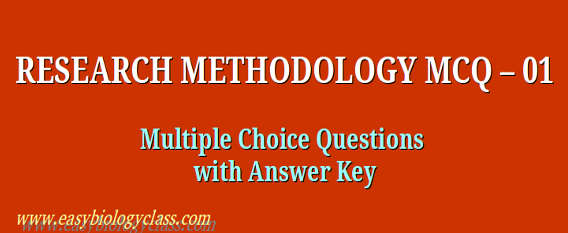Research Aptitude MCQ for the Preparation of Competitive Examinations in Biology such as CSIR NET, ICMR JRF, DBT BET JRF, GATE BT & XL, ICAR JRF NET, SET Entrance Examination, JAM, GS Biology, Medical Entrance, University Research (Ph. D.) Entrance Examination etc.
You may also like: Research Methodology Notes | Research Methodology PPT
(1). What is the aim of research in education?
(a). Help in personal growth of an individual
(b). Help the candidate to become an eminent educationist
(c). Increase job opportunities of the individual
(d). Increase social status of the individual
(2). Inferring about the whole population based on the observations made on a small part is called ___.
(a). Deductive inference
(b). Inductive inference
(c). Pseudo-inference
(d). Objective inference
(3). The most important advantage of sampling method of data collection is _____.
(a). Increase accuracy
(b). The only method of data collection
(c). Save time
(d). Easy to handle the data
(4). Which of the following statement is NOT true about Tippit table?
(a). It is a table of random digits
(b). Used in sampling
(c). A table used in statistical investigation
(d). Values are logarithmic
(5). Which of the following statement is NOT true about Random Sampling?
(a). Random sampling is reasonably accurate
(b). Random sampling is free from personal biases
(c). An economical method of sampling
(d). Can be applied for all types of data collections
(6) A researcher is said to be committed the Type I error when ___.
(a). When he reject a null hypothesis which is actually true
(b). When he accept a null hypothesis which is actually false
(c). Both the null and alternate hypothesis is rejected
(d). None of the above
(7). The best sampling method for sampling a population finite size:
(a). Area sampling
(b). Systematic Sampling
(c). Purposive Sampling
(d). Quota Sampling
(8). Which of the following statements are true about the data in research?
(a). In research the data can be qualitative
(b). In research the data can be quantitative
(c). In research the data can be both qualitative and quantitative
(d). In research the data can be quantitative but never qualitative
(9). Which of the following can be considered as an evaluation research?
(a). How well are we doing?
(b). What are we doing?
(c). Why are we doing?
(d). All of these
(e). None of these
(10). Which of the following best suit for ‘Action Research’?
(a). It is an applied research
(b). It is a quantity research
(c). It is a survey research
(d). It is a population research
(11). Which of the following statements regarding hypothesis is true?
(a). Hypothesis relates variables to constants
(b). Hypothesis relates constants to constants
(c). Hypothesis relates constants to variables
(d). Hypothesis relates variables to variables
(12). Which of the following can be the source of primary data in research?
(a). Survey
(b). Experiment
(c). Survey and Experiment
(d). Survey and Reference
(13). The correlational research seeks to:
(a). Determine the relationship between two or more variables
(b). Study the effect of one on other
(c). Both (a) and (b)
(d). None of these
(14). The following are the features of a good research student except
(a). Should be replicable
(b). Should be systematic and objective
(c). Should be ethical and unbiased
(d). Should be unethical and biased
(15). The population Census carried out by the Government of India can be an example of:
(a). Exploratory Research
(b). Causal Research
(c). Descriptive Research
(d). All of the above
Answer Key
(1). Ans. (b). Helps the candidate to become an eminent educationist
(2). Ans. (b). Inductive inference
(3). Ans. (c). Save time
(4). Ans. (d). Values are logarithmic
(5). Ans. (d). Can be applied for all types of data collections
(6). Ans. (a). When he reject a null hypothesis which is actually true
(7). Ans. (b). Systematic sampling
(8). Ans. (c). In research the data can be both qualitative and quantitative
(9). Ans. (a). How well are we doing?
(10). Ans. (a). It is an applied research
(11). Ans. (d). Hypothesis relates variables to variables
(12). Ans. (c). Survey and Experiment
(13). Ans. (c). Both (a) and (b)
(14). Ans. (d). Should be unethical and biased
(15). Ans. (c). Descriptive Research
<< Back to RESEARCH METHODOLOGY MCQ
You may also like...
NOTES QUESTION BANK COMPETITIVE EXAMS.
PPTs UNIVERSITY EXAMS DIFFERENCE BETWEEN..
MCQs PLUS ONE BIOLOGY NEWS & JOBS
MOCK TESTS PLUS TWO BIOLOGY PRACTICAL
